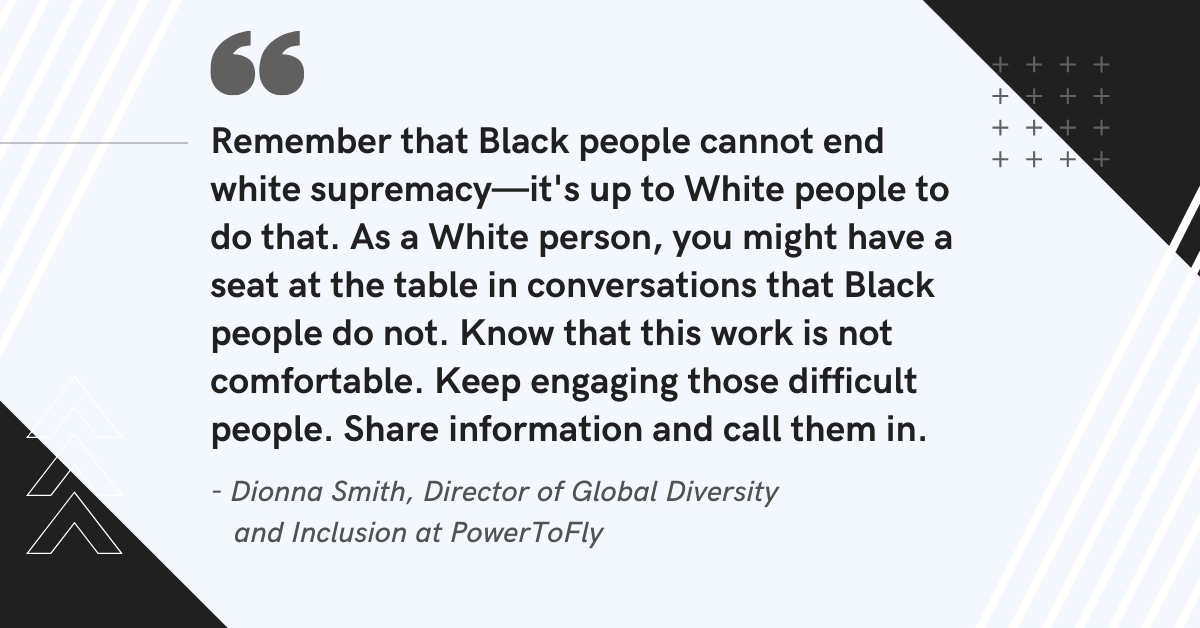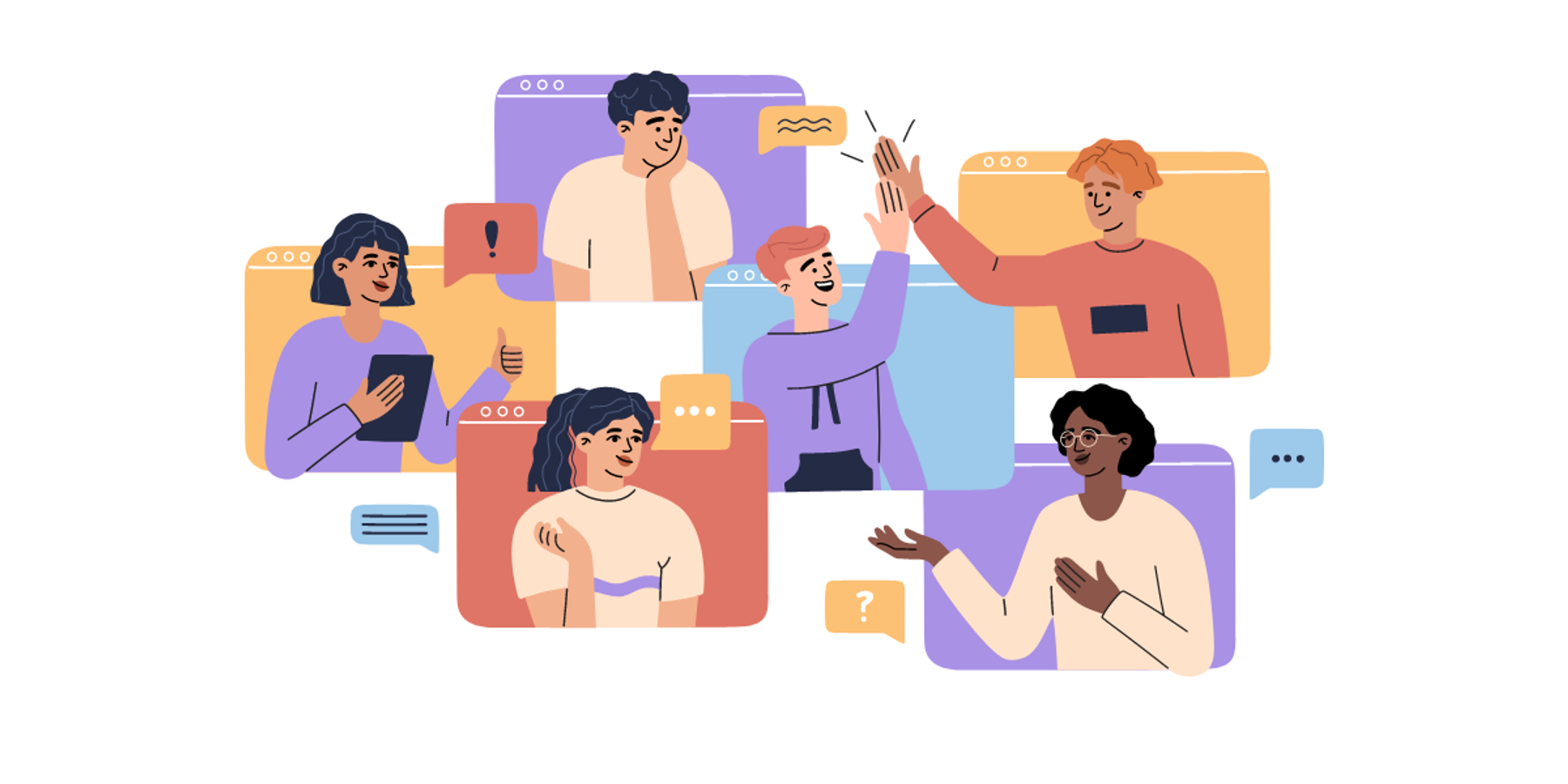It has never been an easy time to be Black in America, and the last few weeks have been harder than most. The recent deaths of George Floyd and Breonna Taylor at the hands of police officers during a time when Black Americans are dying of COVID-19 at three times the rate of white people renewed energy in the Black Lives Matter movement and has led to protests across the nation and the world.
This energy is good. It is vital. It is late in coming, but it is here, and it's time to make the most of it.
As leaders in the Diversity and Inclusion space, we've received an outpouring of questions from our community. What can you do as an individual in your company to support your colleagues? What resources can help catch allies up to what's been going on in the lives of Black Americans for years? And how can we support our teams, friends, and communities?
As PowerToFly's Director of Global Diversity and Inclusion, I led a global chat-and-learn last week to start the conversation on those topics, and I'm writing this now to share the resources and takeaways discussed during that event with all of you.
This talk was focused on individuals and what actions they can take. Please join us again tomorrow for a chat focused on what business leaders can do to support their Black employees.
I want to be clear that I am one person sharing my experience, and that true change will require listening to and lifting up the Black community as a whole—not just me. But let's get started.
Is there a preference between saying Black people, African American, or people of color within the community?
There's not one right answer. There are people who would prefer to be called Black. There are people that prefer the term African American and also people who would hear you say that and say, "You know I'm American, right?" Usually in formal work conversations, we tend to use "African American." Lately, because of the movement, we're using "Black" a lot more than is typical. "People of color" tends to include people of many different ethnicities and minority groups, and the current conversation and this movement is about Black people, not all people of color. It's okay to distinguish between the two.
Overall, just listen and ask. Listen to what the person is using to refer to themselves. Ask them if they have a preference.
How can I initiate conversation with my Black colleagues about recent events without just saying "How are you feeling?" How can I let them know that I support them?
Lead with the fact that you care. Don't be so concerned about making a mistake or saying the wrong thing. I know these conversations can make you feel uncomfortable. But it's far more uncomfortable to have a knee on your neck than it is for us to have these tough conversations. Worry more about just being a good, caring human.
Whether you say, "Hey, I know a lot is happening right now, so if there's anything I can take off your plate, please let me know," or "I wanted you to know I'm thinking of you and will be educating myself further on how to better be an ally in the future," or something else, just make sure you're not centering yourself or whatever emotions you're feeling. Remember that your Black friends may not be able to serve your needs at this time. And think about ways you can support them without them having to ask, too. For example, if they're participating in protests, can you offer to help with childcare? Drop off dinner for their family? Make a recurring donation to their favorite community organization?
If you end up getting into a discussion about the movement with your Black colleagues, do be careful of your language. Referring to protests as riots or protesters as looters is insulting. And don't make this about you. To some white people, Black Lives Matter might feel like "all white people are bad." But remember that if you are not a white supremacist, the only other option is to be an ally. There's no in between.
Also be careful of what you're sharing or saying. Watching video after video of people who look like you being beaten and killed is traumatizing. Be considerate and conscious of what you're sharing and whether it could be triggering for your Black colleagues.
If I feel like I haven't done a good job of creating space for my Black colleagues in the past. Should I reach out to apologize now, or just double down and do better moving forward?
Think about it from the perspective of the person receiving that outreach. Will it feel to them like you're unloading your conscience and making it about you? If you haven't talked about these things with them before, it might. Focus on doing better going forward.
How can I support my Black colleagues even after the media storm dies down?
It's vital to think of this as a long-term issue. If you're in a position of being able to influence policies and procedures at work, or if you have people reporting to you, continue these conversations with your team. Lead a diversity-focused review of your hiring practices. Create a book club around race. Ask for funding to do racial sensitivity and inclusivity training with your team.
If you've been donating, keep doing that in the future, because those organizations will still need help to do their work even once they're not in the news every day.
What to do with fellow white people who do not want to engage in the conversation about white supremacy or police brutality?
Keep trying.
Remember that Black people cannot end white supremacy—it's up to white people to do that. As a white person, you might have a seat at the table in conversations that Black people do not. Know that this work is not comfortable. Keep engaging those difficult people. Share information and call them in.
But at the same time, be cognizant of your energy and whether the person is even listening to you. If you've done your part and provided information, and that person is still not interested, you have to decide whether you can keep that person in your circle. If they are not on the side of what's right, are those the kind of people you want in your life?
How can other minority groups be allies to the black community while also understanding the privileges and biases held against them?
Acknowledge that Black people have demanded the distinction of saying that this is about Black lives right now. That's not to say that other minorities don't experience similar discrimination and that it's not important to come together, but this moment is about standing up for what's right in terms of white supremacy against Black people.
I know that Latinos are suffering. And that the Asian community is experiencing terrible racism right now around COVID. As a Black woman, I am rooted in solidarity to help with those fights. But right now, we're focused on moving the needle for Black people. Try to have that conversation with your community and help them to see that.
How can I influence leadership in my company to be more inclusive and diverse?
If you ever had a fighting chance to have your company pay attention to Black issues and how it affects a company, it's now. Don't give up easily on this. There is no middle road on this, and you have more leverage than ever.
If you're sitting in board meetings, add this topic to the agenda. If you're in team meetings, add it to the agenda. Reach out to your HR rep and ask them what your company is doing specifically to support Black people and employees. If your HR manager is a no, go to your director. If your director is a no, go to your VP. If you were ever able to get on the calendar of someone really high up, it's now. Take advantage of that.
How do I, as a white person, start to have this conversation with my children?
Today's children have an opportunity to grow up more aware of this conversation and to help create a better world as a result. And there are tons of resources out there—books, cartoon programs, movies that have diverse characters—to get started with.
Think about your circles of friends in your community. Are your kids getting exposed to people of different races?
When talking about the history of race dynamics in this country, it has to include a history lesson that's appropriate for each child's understanding level. We don't want white children to feel like they're a bad person. But we do want to start the conversation.
How do I create safe spaces to talk about issues around race at work?
Lead by example. If you're a manager, you can ask your team to read a book about race and lead a conversation about it in your next team meeting. Show your team that you care about this and are willing to put in the work. Don't expect your Black employees to show you the way. Don't assume that Black people on your team want to be the spokesperson for these conversations. Adding more work to them is not the way to do this. Invest that time yourself, and share resources that you've found helpful with the rest of your team.
Remember that Black people who work for you might not be okay. They're carrying trauma. Don't pretend it's not there—or that you can fix it.
You'll know you've created a safe space when your employees feel like they can send you an email or knock on your door to talk about why this is important to them. Until then, keep working.
More questions about how companies should be responding to the current movement and how leaders can ensure they are supporting Black employees and creating a diverse and inclusive work environment?
Join me tomorrow for a chat focused on how leaders can support their Black employees.




